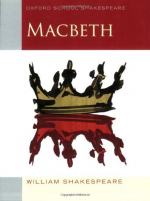|
This section contains 5,688 words (approx. 19 pages at 300 words per page) |

|
SOURCE: “Macbeth and the Meaning of Tragedy,” in Kentucky Review, Vol. 8, No. 2, Summer, 1988, pp. 3-17.
In the following essay, originally delivered as a lecture in 1987, Bryant takes issue with critics who maintain that Macbeth is more of a melodrama or morality play than a tragedy.
For years the one tragedy that almost all Americans read, or at least encountered, was Shakespeare's Macbeth. High schools regularly included it in the curriculum for the senior year, perhaps preferring it to the other major tragedies of Shakespeare because of its brevity, its simple plot line, and its melodramatic appeal. Among professional critics, however, enthusiasm for the play has never been high. Robert P. Heilman in a 1966 essay, revealingly entitled “The Criminal as Tragic Hero,” set forth the principal reason for that.1 Tragedy, he argued, echoing centuries-old opinion, presents a “noble enterprise,” one of uncommon dignity and ethical sophistication, which fails, not...
|
This section contains 5,688 words (approx. 19 pages at 300 words per page) |

|


